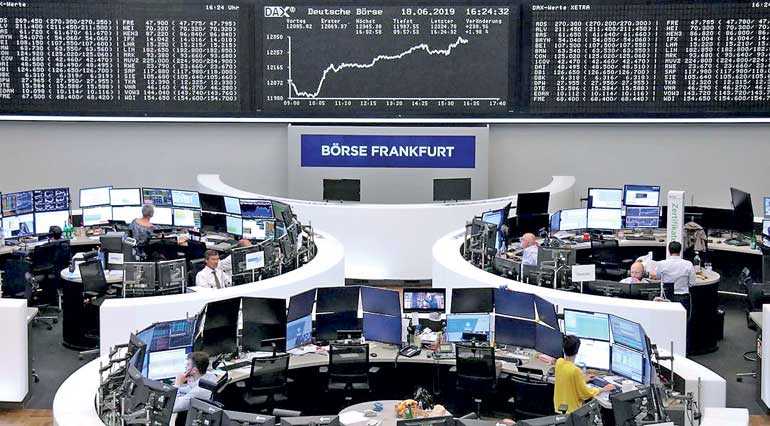Saturday Feb 21, 2026
Saturday Feb 21, 2026
Tuesday, 25 June 2019 00:00 - - {{hitsCtrl.values.hits}}

LONDON (Reuters): European stocks stumbled and the dollar hit three-month lows yesterday as hopes waned for progress in Sino-US trade talks at this week’s G20 meeting and fears of an escalation in Iran tensions flared up.
Investors are waiting to see if Presidents Donald Trump and Xi Jinping can de-escalate a trade war that is damaging the global economy and souring business confidence. The leaders will meet during a G20 summit in Japan.
Pan-European STOXX 600 fell 0.2%, reflecting similar losses in Paris. Stocks in London were little changed.
Germany’s export-sensitive DAX index fell 0.6% after a profit warning from Daimler sent the Mercedes-Benz maker’s shares some 4.2% lower. In addition, data showed that German business morale in June fell to its lowest since November 2014, adding weight to expectations that Europe’s largest economy shrank in the second quarter.
Nonetheless, gains in Asia saw the MSCI regional as well as the broader global stocks gauges rise again towards last week’s six-week highs hit last week. Wall Street also looked in line for more gains after closing lower on Friday. S&P 500 e-minis pointed to a 0.2% rise at the open.
“G20 is turning into a high-stakes poker game for risk and if the side-line talks between Trump and Xi fail and trigger an escalation in tariffs, the odds of a full-blown global recession increase exponentially,” said Vanguard Markets Managing Partner Stephen Innes.
Yesterday, Chinese Vice Commerce Minister Wang Shouwen said China and the US should be willing to compromise in trade talks and not insist only on what each side wants.
US Vice President Mike Pence’s decision on Friday to call off a planned China speech was also considered a positive sign. Pence had upset China with a fierce speech in October that laid out a litany of complaints ranging from state surveillance to human-rights abuses.
Still, most analysts doubt the two sides will come to any meaningful agreement. Tensions are reaching beyond tariffs, particularly after Washington blacklisted Huawei, the world’s biggest telecoms gear maker, effectively banning US companies from doing business with it.
“Any high hopes ahead of the G20 meeting may be disappointed,” said ING Amsterdam Senior Rates Strategist Benjamin Schroeder. “In the end uncertainty will persist and central banks could still be pushed closer to invoking their contingency plans.” The US Commerce Department said on Friday it was adding several Chinese companies and a government-owned institute involved in supercomputing with military applications to its national security “entity list” that bars them from buying US parts and components without government approval.
A Chinese newspaper said FedEx Corp was likely to be added to Beijing’s “unreliable entities list”.
US markets had reached record highs after last week’s signals by the Federal Reserve that it may cut interest rates soon to bolster the US economy.
However, that weakened US currency, causing a dollar index to slip 0.1% lower to 96.11 after its biggest weekly drop in four months last week.
The dollar has led a broad selloff in major currencies as global central banks signalled a dovish outlook on monetary policy amid growing signs of a weak global economy.
The dollar fetched 107.29 yen, having slipped to as low as 107.045 on Friday, the lowest level since its flash crash on 3 January.
“The market is not expecting more Fed rate cuts than it had so far but that the reasoning behind them is being interpreted in a different manner,” Commerzbank FX and Commodity Research Head Ulrich Leuchtmann wrote in a note to clients.
“While for a long time the expected weakening of growth, fears of a recession and low inflation were used as reasons for rate cuts, another reason has now been added to the list: the Fed caving in to the White House.” The euro rose to a three-month high of $ 1.1393 against the dollar.
In developing markets, the Turkish lira strengthened as much as 2% after Turkey’s main opposition won a rerun election in Istanbul for mayor on Sunday, a blow to President Tayyip Erdogan.
Bitcoin pulled back from 15-month highs after jumping more than 10% over the weekend.
Analysts said the gains came amid growing optimism over the adoption of cryptocurrencies after Facebook announced its Libra digital coin.
The glum German data pushed bond yields across the euro zone lower, reinforcing ECB rate-cut expectations.
Economic woes, looming US interest rate cuts and flaring tensions between Tehran and Washington drove safe-haven gold higher. It stood at $ 1,407.9 per ounce, not far from Friday’s six-year high of $ 1,410.78.